Kaisahan Series 2023-2024
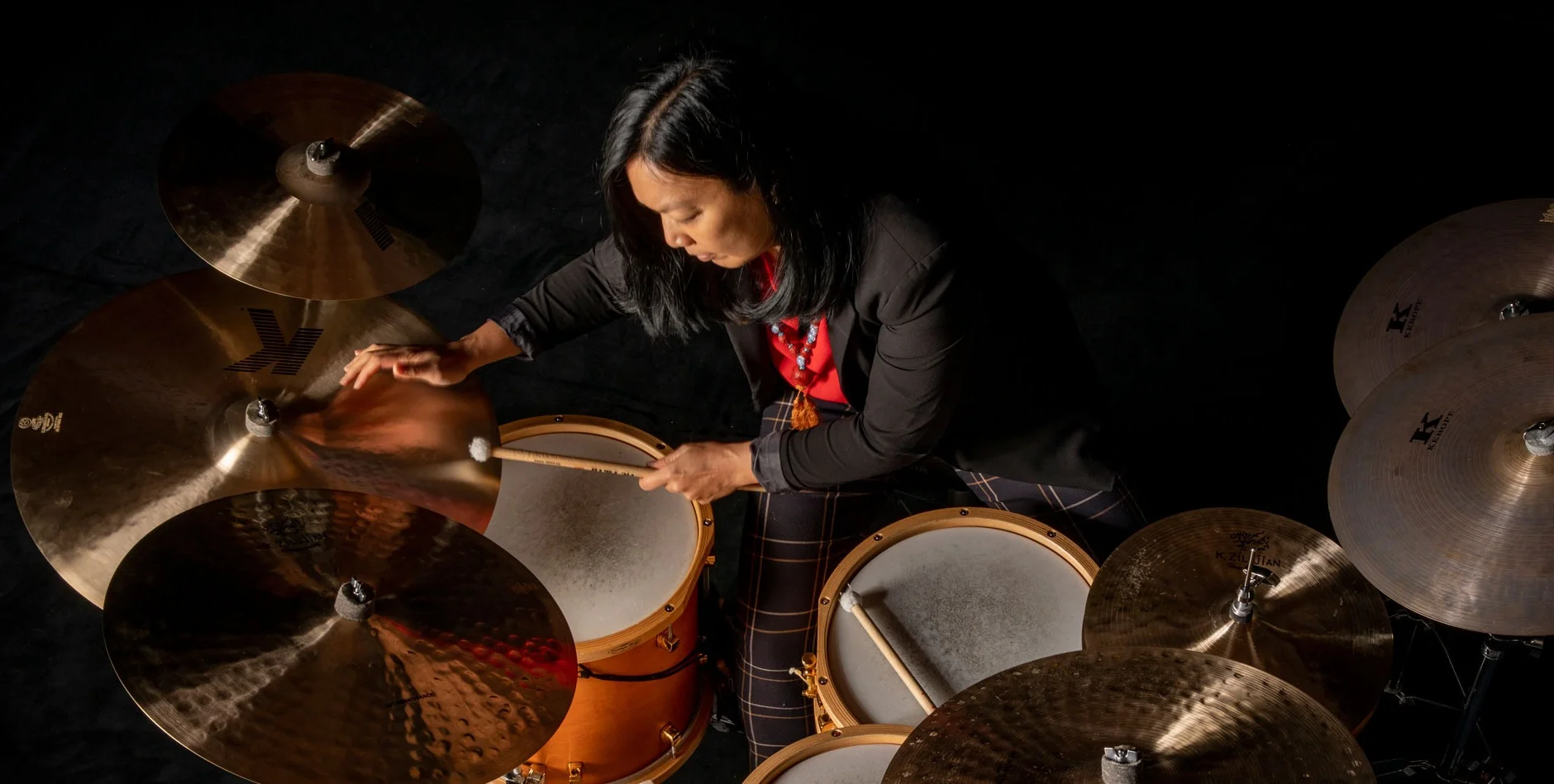
Kaisahan Initiative
2023-2024 Composer-in-Residence Susie Ibarra
We are thrilled to have Susie Ibarra as the Kaisahan Initiative's inaugural Composer-in Residence. Susie Ibarra is a Filipinx composer, percussionist, and sound artist. Her interdisciplinary practice spans formats, including performance, mobile sound-mapping applications, multi-channel audio installations, recording, and documentary. Many of Ibarra’s projects are based in cultural and environmental preservation: she has worked to support Indigenous and traditional music cultures, such as musika katatubo from the North and South Philippine islands; her sound research advocates for the stewardship of glaciers and freshwaters; and she collaborates with The Joudour Sahara Music Program in Morocco on initiatives that preserve sound-based heritage with sustainable music practices and support the participation of women and girls in traditional music communities.
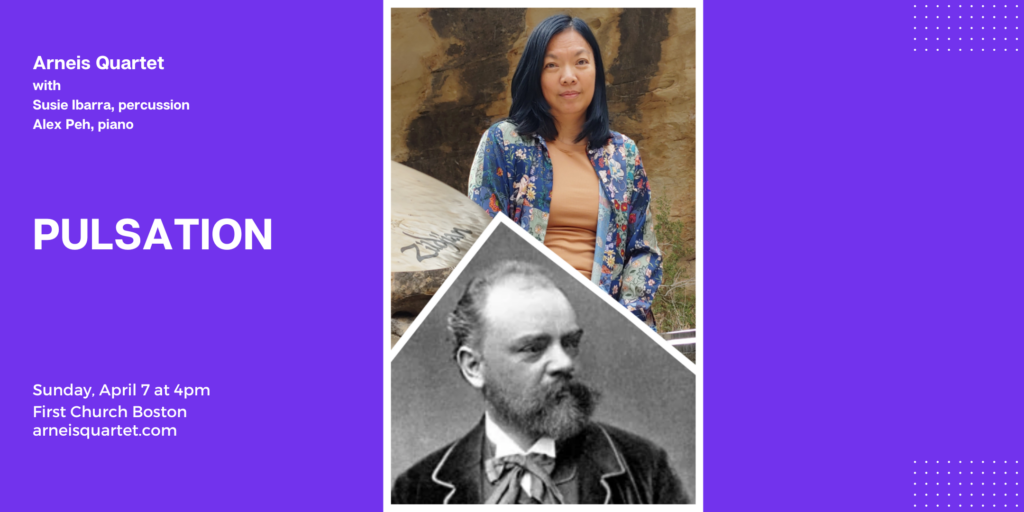
Pulsation Sunday April 7, 2024 at 4pm First Church Boston Music by Susie Ibarra Pulsation Morning Malabar Laktawan at Tumalon Piano and Sarunay Etude 1 Parallels and Confluence: Bugang and Pasig Rivers (world premiere) Antonin Dvorak Piano Quintet in A major, Op. 81 Allegro ma non tanto Dumka. Andante con moto Scherzo (Furiant). Molto vivace Finale. Allegro Arneis Quartet Susie Ibarra, percussion Alex Peh, piano Robert Margo, mandolin Jake Landau, guitar Join the Arneis Quartet and friends as they explore the vibrant sound world of Susie Ibarra and the folk-inspired lyricism of Antonin Dvorak. Pulsation, written by Ibarra for the Kronos Quartet’s 50 For the Future project, channels rhythms found in Philippine kulintang gong music. In Morning Malabar and Parallels and Confluence: Bugang and Pasig Rivers Ibarra draws inspiration from rhythms found in nature combined with elements of kundiman, traditional Philippine art songs heavily inspired by the romantic style exemplified in Dvorak’s Piano Quintet in A major, Op. 81.
Streaming link is provided as a pay-what-you-can service. Please consider making a tax-deductible donation to Arneis today!
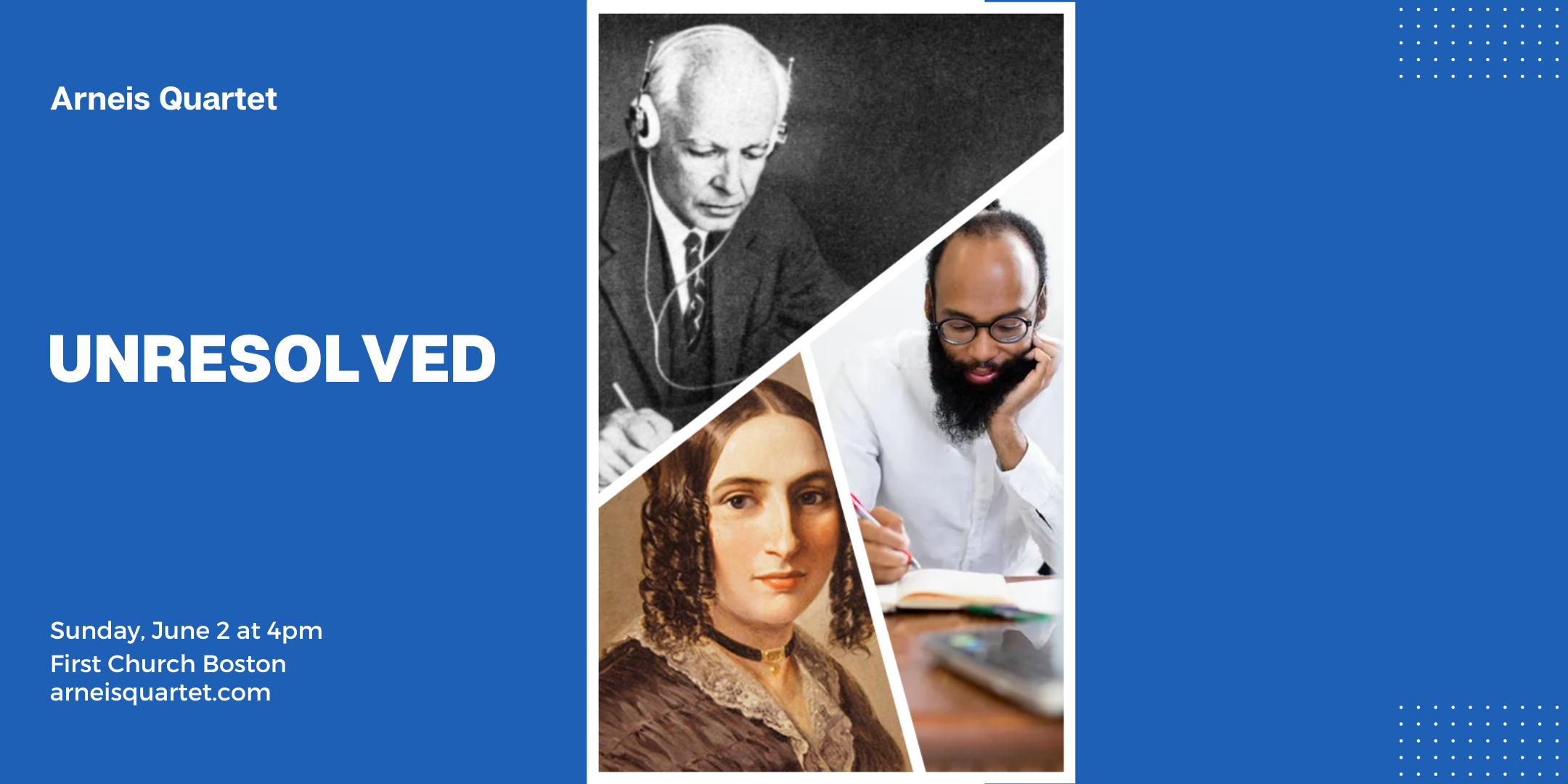
Unresolved Sunday June 2, 2024 at 4pm First Church Boston Anthony R. Green Sacred Ground (2021) Fanny Mendelssohn Hensel String Quartet in Eb major (1834) Béla Bartók String Quartet No. 6, BB 119 Arneis Quartet In this program Arneis explores unresolved aspects of race, gender, and war through works of Anthony R. Green, Fanny Mendelssohn Hensel, and Bela Bartok. “Sacred Ground” was commissioned by Chamber Music Tulsa to commemorate the centennial of the Tulsa Race Massacre. Green starts the work with “a cry and dense music” that then turns into “a complicated reflection, an unstable meditation” expressing how issues of race in the USA that led to the events in 1921 are still unresolved. Fanny Mendelssohn Hensel’s creative energy and desire to compose rivaled that of her brother Felix. Their father Abraham reprimanded Fanny for her desire to pursue composition seriously, stating in a letter that “music will perhaps become [Felix’s] profession, whilst for you it can and must only be an ornament, never the root of your being and doing.” These barriers based on gender still exist for composers. Bela Bartok wrote his sixth and last string quartet in 1939 as the beginning of World War II shook Europe to its core. Via his involvement with the League of Nations as a committee member he bore early witness to deteriorating human rights on the continent paired with rising nationalistic tensions, tragedies that still plague our global community to this day.
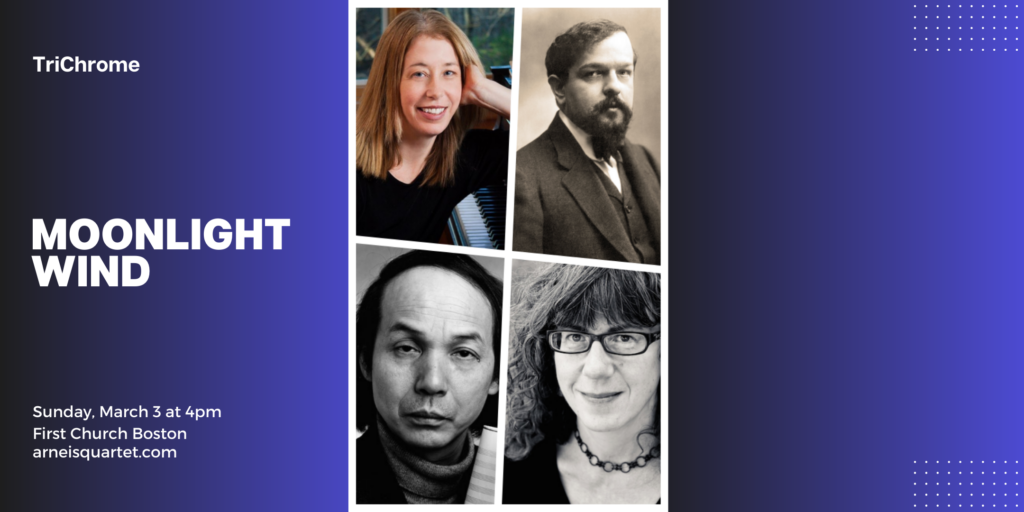
Guest Ensemble Recital Moonlight Wind Sunday March 3, 2024 at 4pm First Church Boston Elena Ruehr Jane Wang Considers the Dragonfly (2009) Marti Epstein Nachtvoll (2014) Toru Takemitsu And then I knew ‘twas Wind (1992) Elena Ruehr Trois Gymnopédies (2020) (world premiere) Claude Debussy Sonata for Flute, Viola, and Harp (1915) TriChrome Vanessa Holroyd, flute Daniel Doña, viola Franziska Huhn, harp Claude Debussy established a new genre when he composed his Sonata for flute, viola, and harp in 1915. Many composers since then have taken to the unique combination of colors offered by this instrumentation . Toru Takemitsu’s And then I knew ‘twas Wind, inspired by Debussy and Emily Dickinson, has as its subject, according to the composer, “the signs of the wind in the natural world and of the soul, or unconscious mind (or we could even call it ‘dream’), which continues to blow, like the wind, invisibly, through human consciousness.” Boston-based composer Marti Epstein counts Takemitsu as one of her major influences and her Nachtvoll evokes the natural world through a different lens. ""Nachtvoll was written in 2013 for Trio Notturno. The formal design is similar to Stravinsky's Symphonies of Wind Instruments. It was written in memory of Hans Werner Henze and ends with a quotation from his piece for soprano, 4 cellos, and harp, Being Beauteous." Elena Ruehr’s Trois Gymnopedies was written for TriChrome during the pandemic in 2020 and is finally receiving its world premiere on this program. The work is inspired by Satie and Debussy. According to the composer "the titles are a kind of poem that harken back to my childhood when I lived on the edge of a great forest near the shores of Lake Superior in Michigan.” Concert program Debussy program notes Takemitsu program notes Like Rain it sounded till it curved by Emily Dickinson
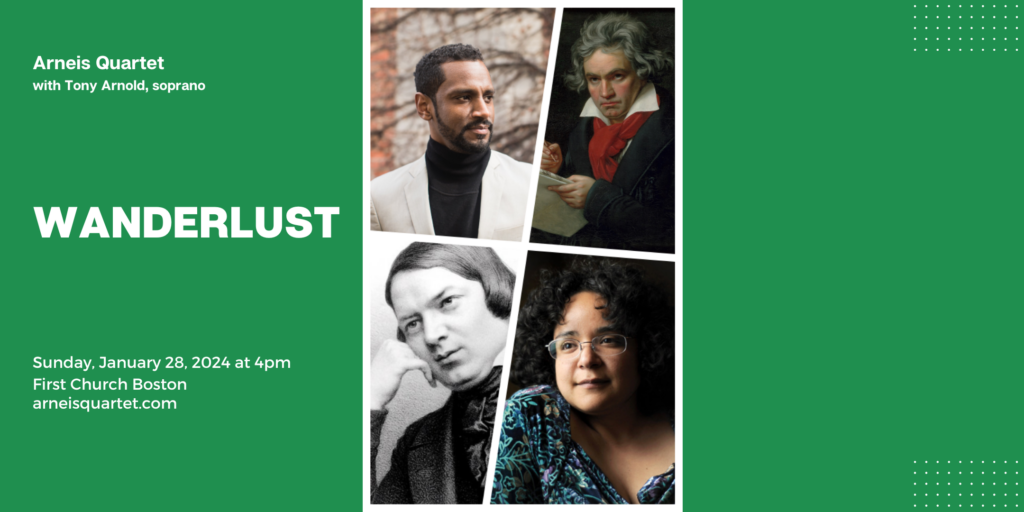
Wanderlust January 28, 2024 at 4pm First Church Boston Carlos Simon Warmth from Other Suns (2020) Ludwig van Beethoven String Quartet in Bb major, Op. 18 No. 6 Gabriela Lena Frank Iberian Songs (2016) Robert Schumann String Quartet in A minor, Op. 41 No. 1 Arneis Quartet Tony Arnold, soprano "Between 1916 and 1970, the mass exodus of African-Americans leaving the rural South, seeking homes in the urban West, Midwest, and Northeast became known as the Great Migration. Inspired by Isabel Wilkerson’s book The Warmth of Other Suns , I chose to bring these stories to life through the voice of a string quartet," remarks Carlos Simon. Arneis continues its Kaisahan Initiative delving into Simon's musical exploration of the emotional highs and lows experienced by those who embarked on the Great Migration. Beethoven's String Quartet in B-flat major, Op. 18 No. 6 , serves as a record of both the joy of the composer as he found confidence in writing string quartets and sadness brought on by the realization of his impending deafness. Soprano Tony Arnold joins Arneis for Gabriela Lena Frank's Iberian Songs which she premiered at Music at Angel Fire. Frank draws her texts from Spanish "deep song", which is a source of lyrics for modern-day flamenco. Robert Schumann's String Quartet in A minor cleverly combines his obsession with Bach with romantic brooding and soaring love songs. Celebrated as a “luminary in the world of chamber music and art song” (Huffington Post), soprano Tony Arnold is internationally acclaimed as a leading proponent of contemporary music in concert and recording as a “convincing, mesmerizing soprano” (Los Angeles Times) who “has a broader gift for conveying the poetry and nuance behind outwardly daunting contemporary scores” (Boston Globe). Her unique blend of vocal virtuosity and communicative warmth, combined with wide-ranging skills in education and leadership were recognized with the 2015 Brandeis Creative Arts Award, given in appreciation of “excellence in the arts and the lives and works of distinguished, active American artists.” Arnold’s extensive chamber music repertory includes major works written for her voice by Georges Aperghis, George Crumb, Brett Dean, Jason Eckardt, Gabriela Lena Frank, Josh Levine, George Lewis, Philippe Manoury, Carlos Sanchez-Gutierrez, Christopher Theofanidis, Ricardo Zohn-Muldoon, John Zorn, and numerous others. She is a member of the intrepid International Contemporary Ensemble and enjoys regular guest appearances with leading ensembles, presenters, and festivals worldwide. With more than 30 discs to her credit, Arnold has recorded a broad segment of the modern vocal repertory with esteemed chamber music colleagues. Her recording of George Crumb’s iconic Ancient Voices of Children (Bridge) received a 2006 Grammy nomination. She is a first prize laureate of both the Gaudeamus International and the Louise D. McMahon competitions. A graduate of Oberlin College and Northwestern University, Arnold was twice a fellow of the Aspen Music Festival as both a conductor and singer. She currently is on the faculties of the Peabody Conservatory and the Tanglewood Music Center.
Program and song texts Beethoven Program Notes Simon Program Notes Frank Program Notes Schumann Program Notes
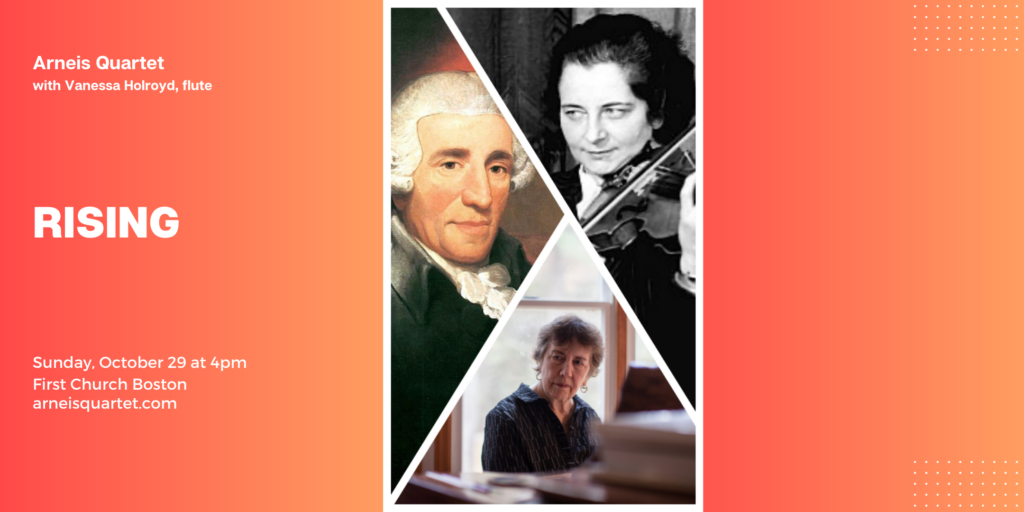
Rising October 29, 2023 at 4pm First Church Boston Franz Joseph Haydn String Quartet in Bb major, Op. 76 No. 4, “Sunrise” Joan Tower Rising (2009) Grazyna Bacewicz String Quartet No. 4 (1950) Arneis Quartet Vanessa Holroyd, flute The Arneis Quartet launches its Kaisahan Initiative with a program of works by some of their favorite composers. Rising arpeggios mark the magical opening of Haydn's String Quartet in B flat major, Op. 76 No. 4, inspiring its English nickname "Sunrise". Joan Tower explores the many ways in which music can "go up" in Rising; flautist Vanessa Holroyd will be the quartet's expedition partner on this musical adventure. Arneis first discovered Grazyna Bacewicz's String Quartet No. 4 when it coached the work at the BU Tanglewood Institute String Quartet Workshop and is excited to add it to their repertoire this season. Bacewicz won first prize for the work at the International Composers' Competition in Liege in 1951, one of the many highlights of her rising career.